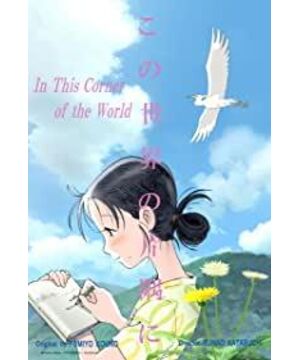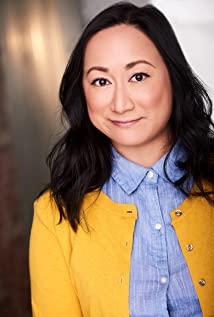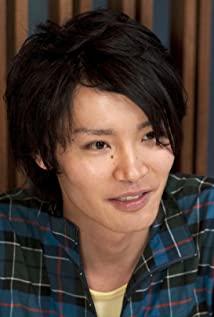Japan, animated films, World War II themes, when seeing these labels, many viewers inevitably put on their existing cognitive concepts: "It won't be another whitewashed film that earns tears", and then forced a The stars are thrown up and berated, there is no "admitting wrong attitude" that I want.
It is true that animation art workers are not politicians who need to flatter a foreign audience. Like "The Burning of the Nation", there are so many works that directly criticize Japanese militarism, and they are suppressed by the right without translation. How many people in China have the ability , Is there a way to see it?
So, to put it simply, think of it as an artistically processed "line drawing" animation. The director just narrates a daily story of a group of civilians that happened in a corner of the world in the context of World War II. In this way, you will have some windfalls.
Feel free to pick a few of your own interesting harvests and talk about it
1
The heroine Suzu , a most ordinary Hiroshima girl
Rich in imagination, with a talent for drawing that warms people's hearts
(painting watercolors for childhood sweethearts, rabbits, egrets; Showa walking stick; food for "Zashiki Douji" when getting lost; and various sketches)
Hardworking and simple life
(On the day I got married to this unfamiliar home, I did what I could do with all my might)
Do things occasionally
(Having lived in Wu City for a long time, I can’t remember the house number; the method of preserving sugar jars and water tanks; the person who can’t always laugh)
2
Ling and her in-laws sister Kyouko
The older sister is avant-garde, dresses stylishly (when she is not at war, her date with her fiancé is to watch movies, eat Western food, and watch expositions), find work by herself, and her husband by herself. Divorced, a typical strong woman character, and she has never directly expressed her difficulties.
Such a person is another obvious manifestation of Ling's psychological changes in the past two years, besides her husband Zhou Zuo.
As the elder sister of a strong woman, at first when I got home, I didn't like Ling, because she already saw in Ling what she didn't want to be. life).
At the same time, in a relaxed tone, interspersed from time to time about my sister's very sad experience
(It has not appeared, but it is obviously at that time that the son who had a lot of naval knowledge under the education of militarism was dragged by his in-laws to inherit the family business after the death of his husband.)
After the loss of her daughter, Ling, who blamed herself for a period of time, did not dare to smile in front of her, but gradually her elder sister began to take care of this younger brother and sister who was also living a very difficult life.
After losing her right hand, Ling wanted to go back to Hiroshima many times. On the day when the atomic bomb was dropped on 8/15, Ling finally determined that her real home was here after listening to the words of her sister who had already expressed her forgiveness.
"The person I love died a long time ago, the watch shop was demolished, and the children were nowhere to be seen. Even so, this is the path I chose.
When I saw Ling obediently marrying into this unknown home, and doing things in an obedient manner, I thought it must be a meaningless life, but Ling's home can be here, anywhere, don't look ahead, just decide for yourself good"
3
Suzu and her husband Zhou Zuo
Simple as a bell, she did not understand the cryptic language that her husband Zhou Zuochu asked her about sex. (Revision of the folk custom of "Persimmon Tree Questions and Answers" in old Japan)
Male: Did you bring an umbrella (for the first time?)
Female: There is a new one (for the first time)
Male: Can you lend me a little (can that?)
Female: OK (yes)
Unexpectedly, Ling really came out with an umbrella, and Zhou Zuo could only use it to eat dried persimmons. Before going out, my grandmother reminded Ling on purpose, but she didn't understand it at the time, and she ended up having an awkward chat.
After marriage, the two respect each other like guests, and neither of them are outgoing personalities. Under the turbulent environment, they can only express their love for each other politely and restrained when they do not meet much.
Zhou Zuo, who is not very confident, even chooses to let Suzu go spend the night with his childhood sweetheart Tetsu Suwon.
Although Ling thinks Suwon is also an important person, she knows her wife's position well, and her colleagues expressed anger at Zhou Zuo's unprovoked suspicion. But they are also more like husband and wife than ever.
"Is that the case with couples?"
"I forced you to be my daughter-in-law, you won't be as angry as Suwon"
"Aren't you angry now?"
Ling has only done makeup twice in total, once to visit Zhou Zuo and painted her white face, and once to send Zhou Zuo to replenish her army and painted red lips
In the ditch of the air raid, facing Ling, who wanted to return to Hiroshima, who was a little self-sacrificing, Zhou Zuo, who was not confident, questioned his mouth again, but his body tried his best to protect his wife again and again.
"This year and a half, I've been very happy. Whether it's walking with you or chatting with you, I'm very happy, aren't you? Is my family still so unfamiliar? If that's the case, then do whatever you want."
The nuclear explosion and the end of the war, the couple returned to work in Hiroshima. On the bridge where they first met, they were the two who finally came together from the heart and chose to go home and live together with new hope.
4
Bell and the war itself
Isn't a film without a "reflection" lens less anti-war? No, it is true that in the film, the director's white description of the truth, the expression of the opposition effect of the war itself from an artistic point of view, is superior.
In the beginning, Ling asked her mother-in-law about her sister, and used her mother-in-law's mouth to express that no one wanted war.
"With such a "rebellious" daughter, I feel like the sky is about to fall, and I still miss the days when I was worried about the little things."
When the father-in-law was protecting Suzu and Harumi during the air raid, he sang "Putting my head down on technology and focusing on peace"
The father-in-law, who is a technician, may be just like the protagonist in "The Wind Rises". He may simply want to realize his mechanical dream and then live and work in peace.
The first time a soldier had a head-to-head conversation was the "Red Deer Military Police" (the stupid military police who used the cute Ling as a spy), which became the laughing stock of the whole family.
Suzu's right hand, Harumi, was originally one of the sources of solace and happiness for her to live in this home. After visiting her father-in-law, she learned that the Yamato had been sunk (symbolizing that Japan was almost defeated with a broken hand). One day, like all wars, the most tragic end is always borne by the commoners, so Suzu lost what she held dear.
The sister came to visit the bell, to the countless air defense alarms, the civilians went from nervous to numb
"It's distorted, it's great that my brother is gone, we can go back to Hiroshima without anyone bullying us, I think so, it's me who's distorted, just like a picture drawn with my left hand"
The country has been warped by war .
Speaking of the most controversial part, the Emperor Broadcasting announced its surrender. My sister silently put away the radio and went to a corner where no one was there to cry bitterly for her daughter Harumi. At this moment, Ling also completely broke out the long-suppressed emotions.
"Our past has just vanished. What I've always thought was reasonable, I've been flying away for the reason of patience, are we going to succumb to violence?"
My first impression when I saw this was that it was real.
What I heard was more like saying, "Why did I pay such a high price, I already knew that this was a twisted me, saying that I would fight to the last person, and since one sentence can declare surrender, why should we lose so many talents? stop?"
At the same time, I thought of Fugui in "Alive": "The chick grows up and becomes a goose, the goose grows up and becomes a sheep, the sheep grows up and becomes a cow, and the cow grows up and becomes a communist ism."
The historical civilians who have suffered but do not know why cannot find the truth of history in their cries of pain, except that they are still determined to live, retain hope, and let those who read the story reflect on it. The next time someone tries to When starting a war, I hesitated because I thought of such a movie scene, then the anti-war effect was achieved.
View more about In This Corner of the World reviews











